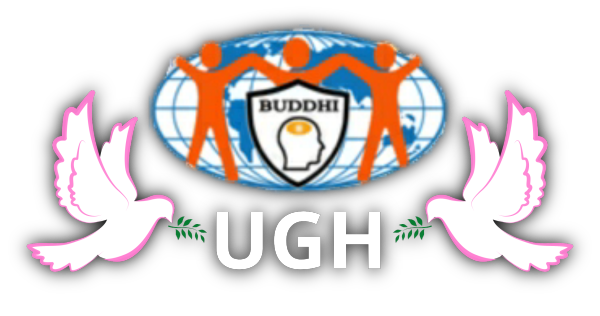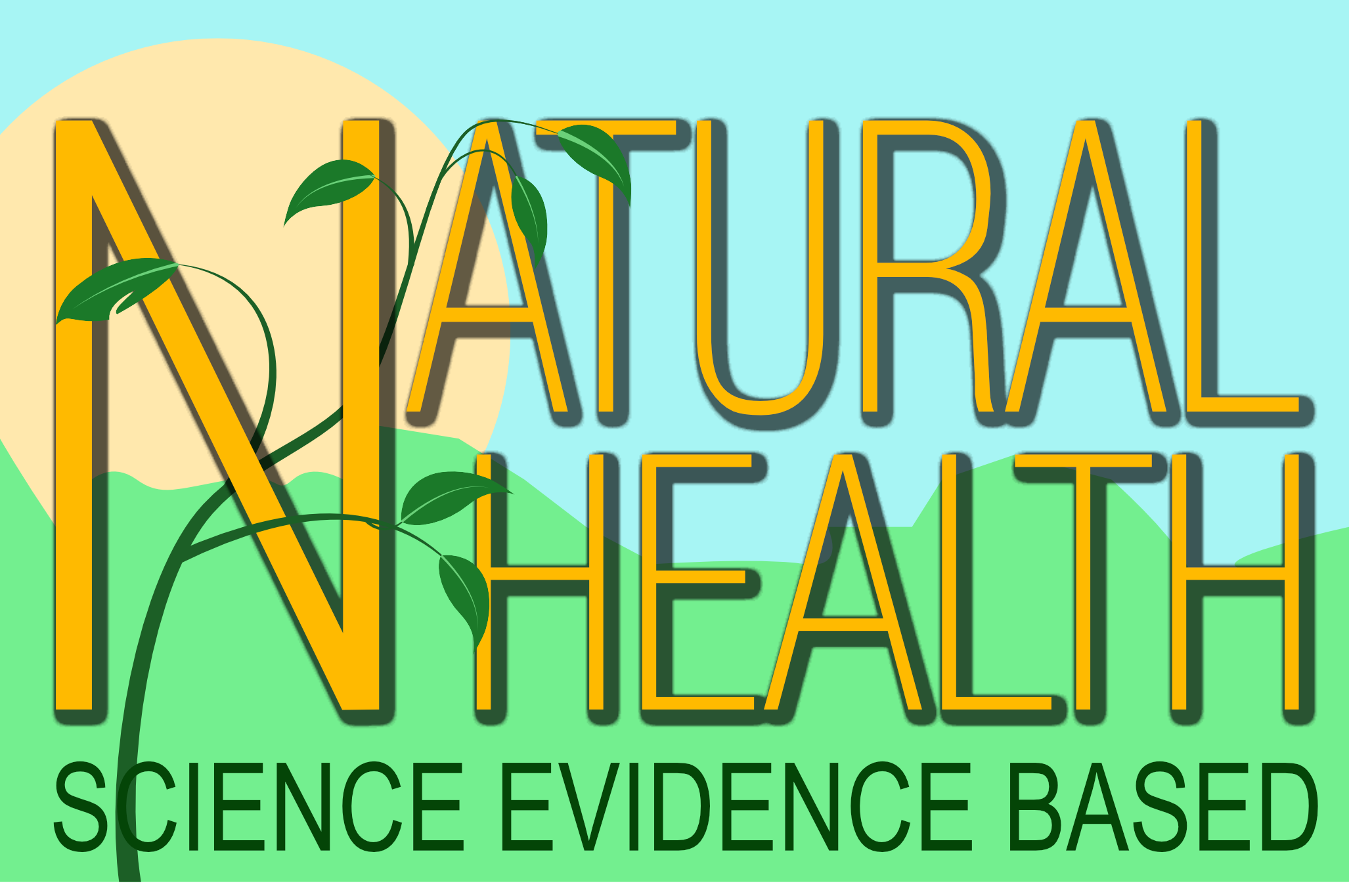Vaccines, the truth
Dispelling the myth and misinformation about vaccines
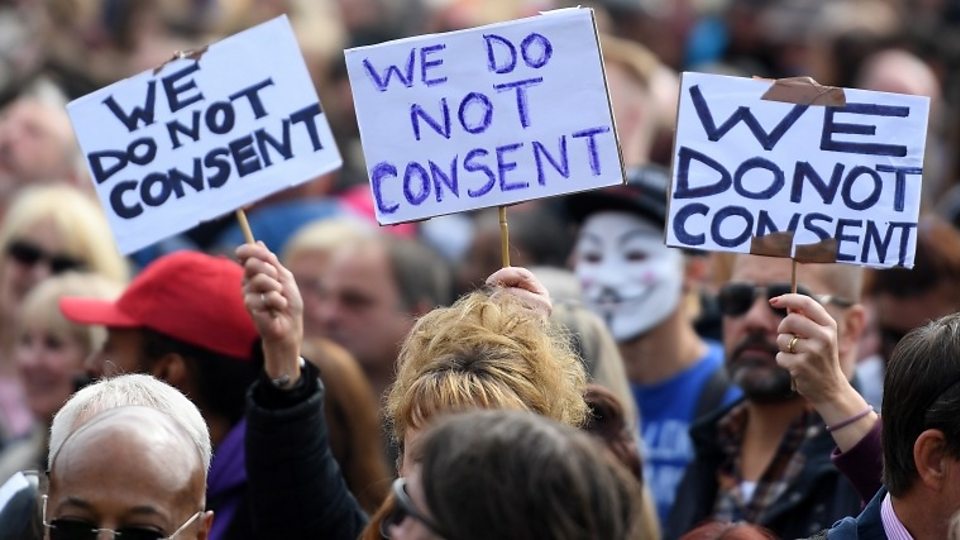
Anti-vaccine protesters
As the Covid-19 coronavirus pandemic rages across the world, Governments and public health officials tell us that life can't return to normal until we get a vaccine. Will most people feel relieved once they have the option to be vaccinated? Will enough people get vaccinated quickly enough to stop the spread of Covid-19?
First it's important to understand how vaccines have improved our lives and to address the concerns of people who might have a skeptical, or strong anti-vaccine, view about vaccines and their use.
Because the use of vaccines became widespread in the 20th century, most of us alive today, particularly in the developed world, do not see sights that were an everyday part of life for many in previous times, such as smallpox wounds entirely covering a loved one's body - although it is estimated that in the 20th century alone smallpox still killed around 300 million people worldwide.
Lockjaw preceeding complete body muscle spasms and death from Clostridium tetani (a bacteria found in soil, dust and animal feces);
Paralysis and death from polio (Polio is a highly infectious disease caused by a virus);
a painfully swollen throat and encephalitis from mumps, the list goes on.
Often those who were hit hardest, and sometimes still are, by these diseases and ailments were children.
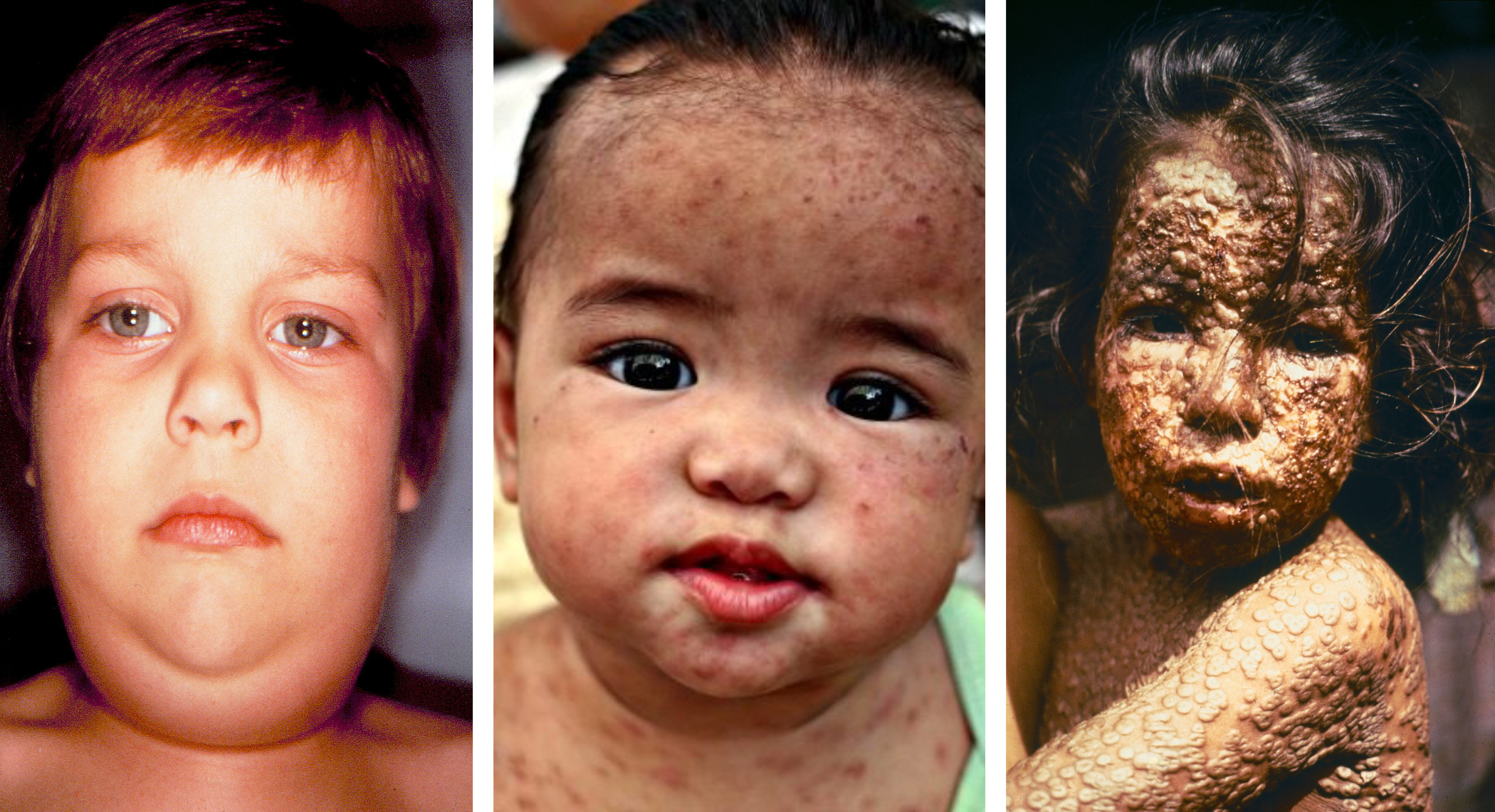
Mumps (left), Measles (center), Samallpox (right)
Those born in 1900 before vaccines became widely implemented, in the United Kingdom for example, had a life expectancy of between 47 and 50 years. Today it is around 79 years. Consider the following infection and mortality rates for diseases, that are preventable with a vaccine, if left unchecked:
- Smallpox - 30% mortality rate = 98.46 million, 0.9 to 2.1 infection rate
- Measles - Up to 10% mortality rate = 32.8 million, 12 to 18 infection rate
- Polio - Less than 1% mortality rate = < 3 million, 5 to 7 infection rate
- Covid-19 - Around 1% mortality rate = 3 million, 1 to 3 infection rate
Now apply those mortality rates, if no action is taken, to the current population of India for example, estimated by the US Census Bureau in 2019 to be 1.366 billion people.
- Smallpox - 30% mortality rate = 408 million deaths
- Measles - Up to 10% mortality rate = 136 million deaths
- Polio - Less than 1% mortality rate = < 13.6 million deaths
- Covid-19 - Around 1% mortality rate = 13.6 million deaths
Historical precedent
There is historical precedent to show what can happen when diseases run rampant through a population that have little of no defence against diseases. Take for example the case of the endigenous population of the americas after the arrival of Europeans.
Between 1492 and 1600, 90% of the indigenous populations in the Americas had died. That means about 55 million people perished because of violence and never-before-seen pathogens like smallpox, measles, and influenza.

World Health Organisation
The WHO (World Health Organisation) declared, in 2019 that two of the three known polio variants have officially been eradicated. The
third, wild poliovirus type 1 [WPV1], is still a present threat in two countries, Afghanistan and Pakistan with an R (reproduction) or infection value of 4-6.
This means that for every 1 person who contracts the disease they will - without effective measures in place - infect between 4 and 6 others.
thanks to vaccines we don't have to worry so much about us or our children dying or becoming crippled and disfigured from a preventable disease
While it's hard to say exactly how many people every year would be infected and die from the preventable diseases listed above, just consider this, for every person infected with the seasonal flu, they spread it to between one and two people (an infection rate between 0.9 and 2.1). And on average each year, 8% of people in the US come down with the seasonal flu.
But thanks to vaccines, and the efforts of right minded individuals, Health Professionals, Health Organisations, and Governments that care about the health of their citizens, we don't have to worry so much about us or our children dying or becoming unnecessarily crippled and disfigured from a preventable disease.
In fact, as successive generations of us have avoided these almost completely avoidable sufferings, an increasing number of people are even taking vaccines for granted because they don't realise how bad life can and would be without them.
Addressing the vaccine skeptics
"Vaccine hesitancy" is on the rise. The WHO identified it as one of the top ten threats to global health in 2019.
"Conspiracy theorists" is often used as a derogatory term to marginalise those people who are somewhere on the 'skeptical' scale. However, it's good to be skeptical. Anytime a new scientific study or theory comes out, scientists are the first ones to be skeptical. "Anti-vaccer" or 'anti-vaxxer' is another term that's often used to critically condescend people who are concerned about any potential negative health implications of vaccines.
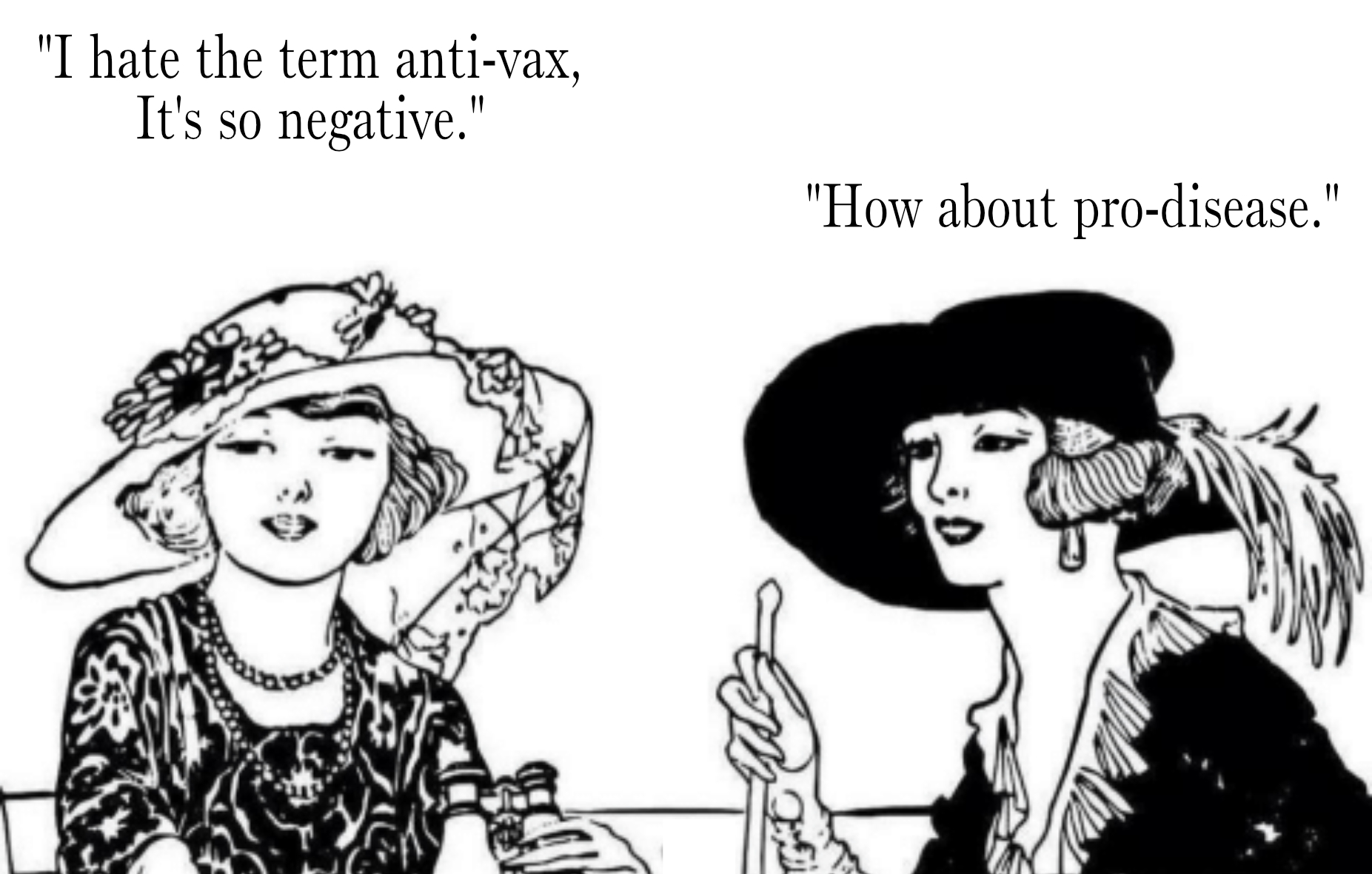
Anti-vaccination cartoon
These pejorative terms are great for labeling 'heretics' but bad for winning over converts.
The truth is that, at first glance, there are some legitimately questionable aspects to vaccines - especially for concerned parents who want the best for their children. some of these concerns are:
1 Some vaccines contain mercury, and scientists suspect mercury is an environmental risk factor for causing autism and learning disabilities
2 Some vaccines involve injection of a live disease
3 Vaccines can have dangerous side effects
4 Not everybody needs to be vaccinated because herd immunity offers protection
While the above statements are true, knowing their underlying complexities means a more informed understanding about vaccine safety.
What the medical professionals say
1: Some vaccines contain mercury, and scientists suspect mercury is an environmental risk factor for causing autism and learning disabilities.
It is true that some vaccines contain mercury, and scientists suspect mercury exposure is an environmental risk factor that can increase the rates of autism and learning disabilities. But here's what else is vital to know.
The MMR (measles, mumps, rubella) vaccine, the chickenpox vaccine, the inactivated polio vaccine, and pneumococcal conjugate vaccines (vaccines against strep pneumonia) never contained mercury.
Since 2001, mercury has been removed from other vaccines intended for children. All vaccines that are routinely recommended for children six years of age and younger are available in formulations that do not contain mercury.
The most common vaccine that does contain a mercury compound (as a preservative) is the seasonal flu vaccine, and this is also available in formulations that do not contain mercury.
So, if mercury is dangerous why is it used, even as a preservative?
The danger posed by mercury depends on what chemical compound it's in. The same applies to alcohol. You can drink ethyl alcohol
on a night out and you may wake up the next morning with a thumping headache wondering what embarrassing things you did, but ...
if you drink methyl alcohol, also called wood alcohol ( Methanol (CH3OH) ), chances are you'll go blind.
For vaccines that do have mercury, the mercury is in the ingredient thimerosal. Thimerosal contains ethylmercury, and this type of mercury is broken down and readily cleared from the body; it doesn't pose a danger of building up like the more harmful form of mercury, methylmercury.
Methylmercury poses a danger to humans in the environment. This is the type of mercury people can become sick from if they eat too much contaminated seafood, such as been recorded as happening in Japan. This is also the type of mercury that is linked to increased rates of autism and learning disabilities.
Ethylmercury, the kind of mercury in some vaccines, has been studied and found to have no links to autism. In some rare cases people may be allergic to ethylmercury, but such is the case with all medications not only vaccines.
2: Some vaccines involve injection of a live disease
This is true. Some vaccines contain live-but-weakened (attenuated) forms of diseases
Live, attenuated vaccines fight viruses and bacteria. These vaccines contain a version of the living virus or bacteria that has been weakened so that it does not cause
serious disease in people with healthy immune systems. Because live, attenuated vaccines are the closest thing to a natural infection, they are good teachers for the
immune system.
Examples of live, attenuated vaccines include measles, mumps, and rubella vaccine (MMR) and varicella (chickenpox) vaccine. However, live attenuated vaccines are relatively riskier than other types of vaccines that involve dead viruses and bacteria. Even though they are very effective, not everyone can receive these vaccines. Children with weakened immune systems, for example, those who are undergoing chemotherapy, cannot get live vaccines.
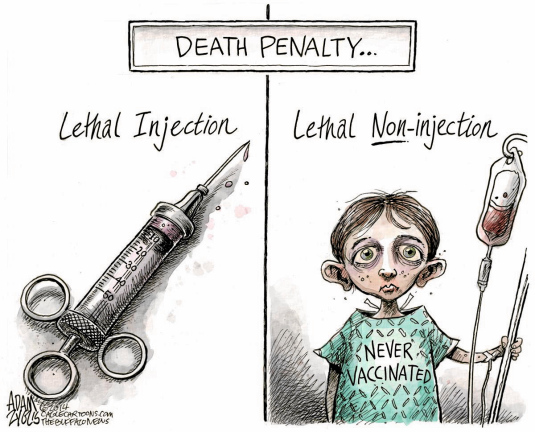
Cartoon aimed at anti-vacc parents
There is a very small chance of a live attenuated vaccine infecting the person who is vaccinated. This almost never happens, and the risk of this happening is far lower than the risk of actually contracting the disease if not vaccinated.
All public health officials do consider those risks very carefully. It's for this reason that the smallpox vaccination is no longer required.
Following a worldwide program that originally began in 1959, the 33rd World Health Assembly officially declared the world free of smallpox on May 8, 1980. As smallpox
has been eradicated and therefore the potential for complications arising from the vaccine, as small as they are, outweigh the now virtually-zero risk of contracting it.
Other vaccines contain inactivated (dead) viruses and bacteria, their components, or their associated toxins. These include vaccines for whooping cough (pertussis), tetanus, and diphtheria. It is considered impossible to become infected from these types of vaccines.
3: Vaccines can have dangerous side effects
They can - as with all medications - but these are rare, and the odds of becoming sick and experiencing the negative and potentially life-threatening effects of something like the measles or mumps are far higher. The same goes for the odds of being allergic to a vaccine.
4: Not everybody needs to be vaccinated because herd immunity offers protection
Herd immunity occurs when so many people are immune to an infectious disease - as a result of having already contracted it and developing a natural immunity, or through immunization - that the disease can't spread to others to maintain itself in a population; it's defeated by a person's immune system before it can establish itself in its next host.
While it is true that herd immunity offers protection for those who aren't vaccinated, the required percentage of people in the "herd" who must be vaccinated or are immune is different for every infectious disease.
For a highly contagious disease like the measles, heard immunity requires approximately 95% of a community to be immune. Vaccines themselves are typically 95% to 99% effective.
As an example, with a population of say 65 million, if the measles vaccine is 95% effective it will mean that 3.2 million people will likely contract the disease if no action is taken; so this margin of error makes the largest number of people being vaccinated for measles particularly important.
Herd immunity for the seasonal flu usually kicks in when about 60% of the population is immune.
Current predictions for the Covid-19 pandemic, which is more virulent and contagious than the seasonal flu - for every person who gets it, they infect between five and six people if preventative measures are not taken. According to the most recent data the requisite herd immunity is at least 82% population.
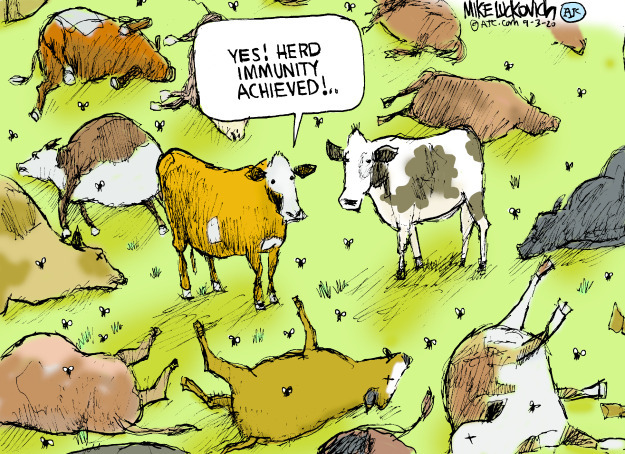
Herd immunity cartoon
However if you rely only on herd immunity only to protect you you're taking a huge gamble and the odds are not in your favor; plus you are putting everyone else in your community at a heightened risk.
How Do Vaccines Actually Work?
Your body's immune system can identify invading infectious diseases, develop a plan of attack, implement that plan for a successful defeat, and remember its plan
of attack for later if the attacker ever returns.
Vaccines are a way of safely introducing would-be invading infectious diseases to your body's immune system. There are four main types :
- Live attenuated (weakened) vaccines, these are weakened versions of viruses and bacteria that offer the best lifelong protection, but because they do contain live components they're not recommended for people with diminished immune systems, such as people with HIV/AIDS.
- Inactivated vaccines, these are made from whole pieces of dead bacteria and viruses. Your body can still recognize these diseases and develop and maintain its immune response relatively effectively.
- Subunit vaccines, these are made from partial components of dead bacteria and viruses. However because these only involve partial pieces of the disease, your body's immune system may need to be reminded about these from time to time with a booster shot.
- Toxoid vaccines, sometime it's not the actual bacteria or virus itself that's a problem; it's the toxins they produce. These vaccines guard against those, but because your immune system doesn't produce the toxin antigens itself it will need to be periodically refreshed. The tetanus vaccine is an example of this.
Vaccines have the best outcomes when everyone in the community is vaccinated. Because of the nature of individual immune systems, vaccines don't work for between 1% and 5% of people. People with weakened immune systems who cannot receive live attenuated vaccines and those who are allergic to certain vaccines also lower the totals for a community's level of immunity. The fact that some people can't have vaccines has implications on the level of herd immunity; this underscores why it's vitally important for everyone who possibly can be is vaccinated.
How long does it take to create a vaccine?

The time it takes to develop a vaccine depends on several factors, starting with the infectious disease itself. There are no vaccines for some things that have been
around for centuries like the common cold. Malaria is said to have brought down the Roman Empire but there is still no effective vaccine for it today.
In the case of Malaria for example, a quickly evolving parasite (Plasmodium) continues to thwart vaccination efforts although trials are currently underway.
Aside from natural limiting factors, demand and funding also have big impacts on vaccine development. When there aren't any unusually difficult challenges posed by nature and there is plenty of demand, vaccines can usually be developed in around 18 months.
After vaccine development there's an intricate process of testing them for safety that takes time. First it's tested in animals, then it's manufactured according to strict guidelines, then it is tested in clinical trials in humans, and once it's approved it must be produced and distributed according to the levels of demand. Each of these steps can take months.
Some vaccines for diseases that mutate quickly must be re-released and updated, the seasonal flu vaccine is an example of this, that is re-developed twice every year. Booster inoculations for other types of vaccines are necessary to remind your body's immune system to stay alert for a particular disease or to re-invigorate it with antigens, not because the infectious disease has mutated.
In the case of the Covid-19, a worldwide effort to rapidly develop a vaccine resulted in two vaccines being developed, at record breaking speed, and approved for emergency use in the UK in December 2020, with a third receiving approval in January 2021.
In the case of Coronavirus, clinical test data showed that two inoculations are ideally needed to confer full immunity. In the UK, as of January 2021, the Government implemented a
policy of giving the first dose of the Covid vaccine to as many people as possible in place of both jabs allowing for many more people to receive at least some protection.
Trial data shows that a good level of immune response is provided by the first dose allowing the second dose to be safely delayed until some weeks later.
Anti-vaccer's Are Nuts!
Anti-vaccers are "nuts" says UK Prime Minister Boris Johnson
Anti-vaccers are "nuts". That was UK Prime Minister Boris Johnson's opinion when he visited a London Doctors surgery in 2020 to discuss expanding coverage of the flu vaccine.
Evidence overwhelmingly shows that vaccines really do work, and have saved millions of lives.
However, isn't it an irony that one of the most effective and beneficial medical interventions known to medical science is the one that's regarded with the most mistrust and suspicion by a large percentage of people around the world.
We may ask, "Why can't these foolish anti-vaccine adherents just trust the experts?"
But it might be unwise to take such a narrow view of the anti-vaccination movement without looking at some background. For although the evidence on the effectiveness and safety of
vaccines is incontrovertably - in my opinion - clear, scientists and doctors have not been immune to mistakes and errors over the years in how they've handled them.
Deliberately pitting the misinformed anti-vaccers against the scientific experts risks hiding the mistakes those experts have made in the past - and risks us all failing to
learn from the cautionary evidence.
2020 was a big year for vaccines. As well as the UK Government's flu vaccine push, initial results from new COVID-19 vaccine trials appeared in the UK medical journal The Lancet. The trials showed that the vaccines had minimal side-effects and definitely invoked an immune response. The success of Phase I and Phase II
trials were just the first, although crucial, steps on the way to finding a working vaccine.
The trials subsequently moved to larger, Phase III trials, involving many thousands of people, testing whether those who got the vaccine were actually less likely to catch Covid-19 than
those who were injected with a placebo. The results of Phase III trials led to the authorised use in the UK of two vaccines.
It is also ironic however that The Lancet in particular lead the publication of the research on Covid-19 vaccines; besides being a prestigious medical journal, the main public claim to fame of that particular journal is in publishing one of the worst and most damaging vaccine studies of all time. That was, of course, Andrew Wakefield's now notorious article linking the MMR vaccine to autism.
Its publication in The Lancet in 1998 ignited flames in the anti-vaccine movement, with damning media suspicion heaped onto the MMR vaccine causing a severe decline in the administering of it to children, resulting in a deadly surge in measles cases in the UK and worldwide.
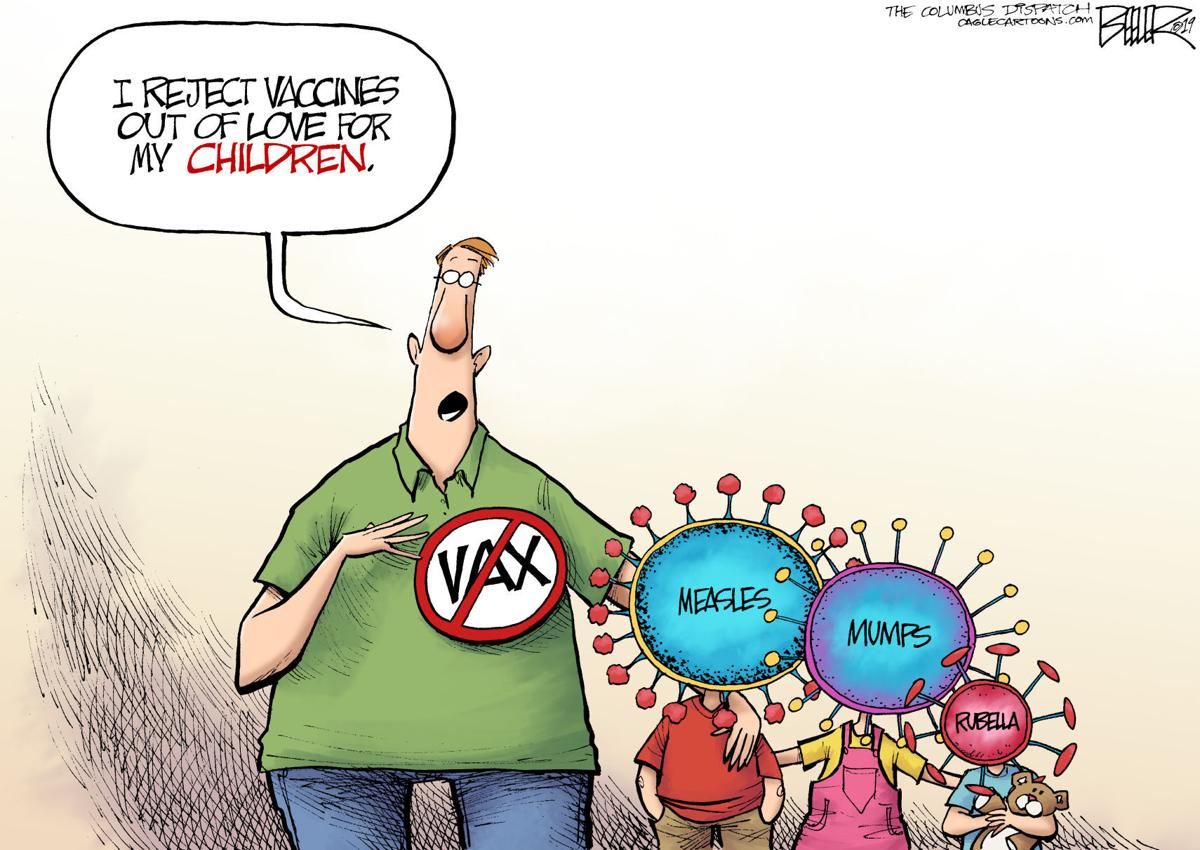
Cartoon lampooning anti-MMR adherents
Many large, high-quality studies have been carried out on Wakefield's research findings and have subsequently found that Wakefield's MMR-autism correlation, as well as his ridiculous theory about how the attenuated virus from the vaccine caused gut - and brain-related symptoms - was untrue.
Worse, though, is the fact that Wakefield wasn't just wrong - he was a fraud.
After the study's publication and the attendant controversy, the investigative journalist Brian Deer began to dig into Wakefield's data and, crucially, his motivations. He found that Wakefield had fabricated the medical records of every single one of the children in his study to make it appear as if their autism symptoms had come just after the MMR, whereas many had shown symptoms before or long after receiving the MMR vaccine and some none at all.
As for the motivation, Deer showed that Wakefield had two major financial interests in the research turning out the way it did. First, he was being retained, on a substantial fee, by a lawyer who had plans to sue the makers of the vaccines on behalf of the parents of children with autism. Indeed, an anti-vaccine pressure group linked to this lawyer was how Wakefield recruited the patients for his study. Second, the year before the study's publication, he had applied for a patent for his own single measles vaccine and would thus have profited had his research frightened people away from the combined MMR. Inexcusably, neither of these interests were disclosed in the paper: it merely noted that the work was funded by "Special Trustees", and that the parents of the children "provide[d] the impetus for these studies."
The publication of the Wakefield paper tarnished the reputation of The Lancet, and the peer-review process of science more generally. Even without the fraud, a study with such earth-shattering implications that only included twelve patients should never have been published somewhere so prominent. Compounding the damage was the sheer amount of time it took for the paper to be officially retracted - an astounding twelve years. All the while the research remained unretracted anti-vaccers rallied to the peer-reviewed study to support their view.
More alarmingly for me is the fact that disgraced former doctor Wakefield is leading a renewed charge by anti-vaccers against the Covid-19 vaccines
It was, he said in July 2020 , "one big hoax: a cynical plot by pharmaceutical giants - aided by governments, scientists and the media - to force the world to be unnecessarily and dangerously vaccinated."
In an article for The Daily Mail, Tom Leonard writes, These are terrifyingly gullible times - the perfect environment for Wakefield, who is still shamelessly preaching the same dangerous anti-vaccine message a decade after it was discredited by British medical authorities.
Looking at the overwhelming evidence for vaccines I wholeheartedly agree with Leonard.
A look at the history of the anti-vaccination movement
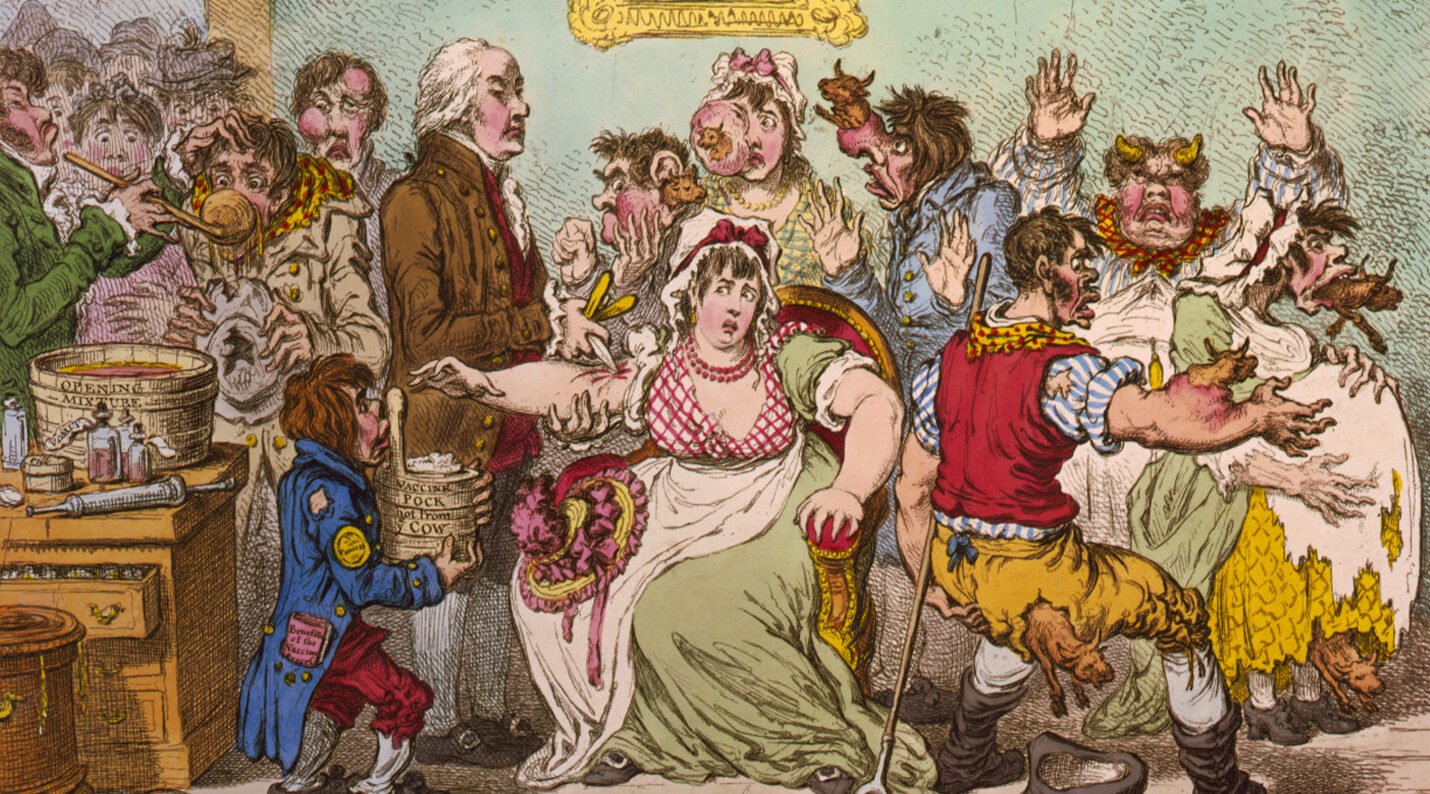
Anti-vaccination cartoon about Edward Jenner's smallpox vaccine
The anti-vaccination movement has been with us for a long time, indeed, for as long as vaccines, witness the outcry over Edward Jenner's vaccine for smallpox.
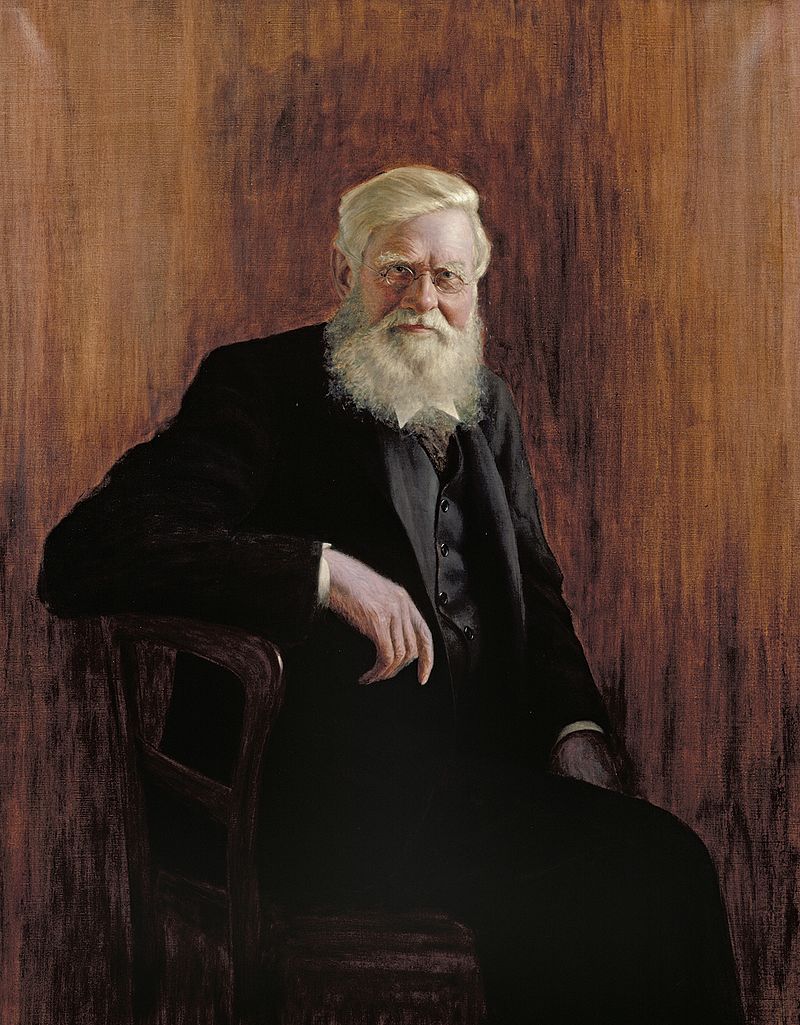
Alfred Russel Wallace
Some renowned historical scientists have been a part of it, for example Alfred Russel Wallace, who formulated the idea of natural selection independently of Charles Darwin, was an unbending opponent of the mandatory smallpox vaccine during the late 19th Century.
Although Wallace was almost certainly a bit "nuts " - he spent a great deal of time trying to convince his peers that spiritualist mediums really could talk to the dead and take photographs of ghosts - his approach to analysing the effects of vaccines, that he argued were actively dangerous, was statistically quite sophisticated for the time.
Given that 'statistics' were in such an early phase of their development, the pro-vaccine lobby had little convincing data to oppose him.
Wallace expressed his opposition to vaccines in several ways including, in terms socialist theory, when he claimed that vaccines were seen as a 'quick fix' that failed to "get rid of the foul conditions" that caused disease to spread among the poor of Victorian Britain.
These arguments weren't the ravings of a madman, and they hint at the complexity of the anti-vaccine position. Thus defenders of vaccines need to work on multiple fronts to combat objections that are not always easily-debunked.
An irrational Cognitive bias?
Psychologists often invoke a whole string of cognitive biases to explain why people are irrational about vaccines, for example the 'availability heuristic' (where people focus on immediately available information at the expense of a more rational appraisal of the situation); 'omission bias' (refers to our tendency to judge harmful actions as worse than harmful inactions - such as not having a child vaccinated, even if they result in similar consequences), and so on.
Evidence suggests that if people think there's a high chance they'll regret having a vaccination, they're less likely to do it
Evidence suggests that if people think there's a high chance they'll regret having a vaccination, they're less likely to do it.
Evidence that we can change people's beliefs about vaccines for the better is scarce, but changing them for the worse by providing credible-sounding reasons for regret - like in the case of Wakefield's MMR-autism connection or sensationalist media headlines - is much easier.
A catalogue of blunders
Unfortunately, the publication of Wakefield's study is far from the only significant blunder by vaccine scientists and regulators over the years. Relatively soon after his phony paper was published, the US and the EU capitulated to anti-vaccine campaigners on the issue of thiomersal (sometimes spelled thimerosal), a mercury-containing chemical that had long been used as a preservative in vaccines, and had been - you guessed it - linked to autism by the anti-vaccers.
The idea of injecting a poisonous substance like mercury into your child's arm can be made to sound very frightening, but the type of mercury in thiomersal (ethylmercury) isn't the same as the type we normally talk about in reference to mercury poisoning (methylmercury, which stays in the bloodstream for far longer and can have seriously damaging effects even at small doses) or dimethylmercury that is astoundingly toxic even in minute quantities.
There was never any evidence to support campaigners' assertions that vaccines containing thiomersal were linked to autism, but something certainly appeared to be going on once the health experts suddenly decided that thiomersal had to go, banning it from almost all vaccines given to children from around the turn of the 21st century.
Those authorities began speaking out of both sides of their mouths, on one side saying thiomersal was completely safe whilst on the other side also recommending it should be removed from vaccines "as expeditiously as possible".
What were right-minded parents supposed to think?
Once again, anti-vaccine campaigners used the confusion to boost their message, with a flare-up of the mercury-autism controversy - as well as a raft of personal injury claims in courts - occurring after the preservative had needlessly been removed from the vaccines.
Not only did the experts put other countries that still used thiomersal in their vaccines - particularly those in the developing world - in an difficult position, they also torpedoed their own future authority. Any use of the terms "completely safe" or "no evidence for adverse effects ..." would now be met with references to their apparent lack of straight forwardness on thiomersal.
The history of vaccination has numerous further examples. For example the rushed, politicised roll out of the flu vaccine in the US in 1976 - and the potential increase it caused in the rare neurological condition Guillain-Barre Syndrome - was blamed for spawning anti-vaccine suspicion; as did the catastrophic lab errors that caused live polio viruses to be injected into 200,000 children in 1955, killing ten and permanently paralysing hundreds more.
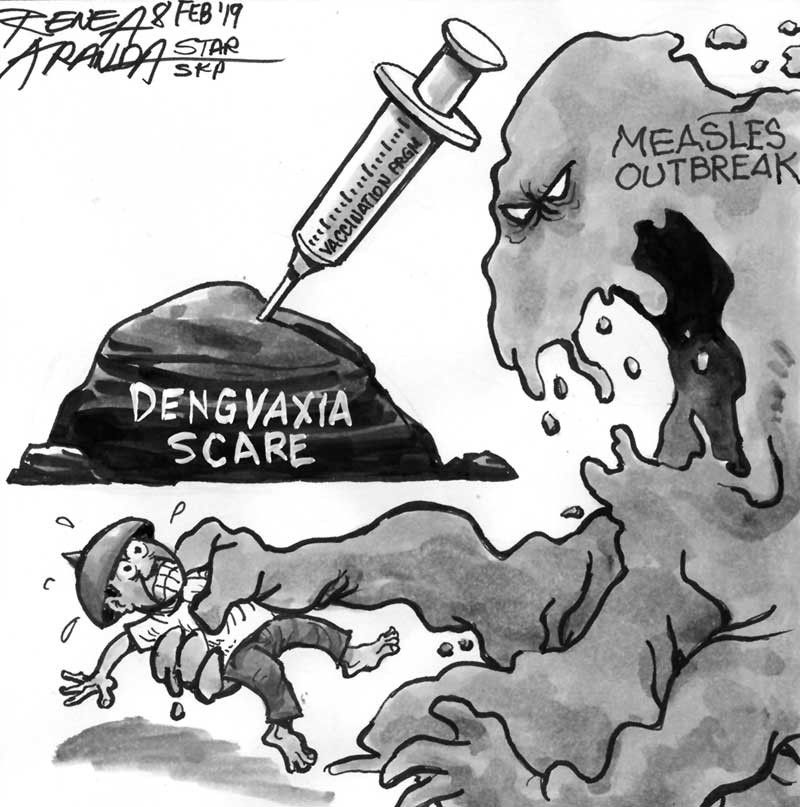
Cartoon showing how Phillipines measles vaccination programme was blunted after the Dengvaxia scare
Although safety procedures have since improved dramatically, disasters do still occur, such as the 2016 case of the faulty dengue fever vaccine in the Philippines which ended up making the illness worse and causing the population to reject any vaccinations, that led to a surge in cases of measles.
Other failures are not the fault of doctors or scientists, but still make for terrible PR for vaccines, for example the hepatitis vaccination programme propagated and used by the CIA to spy on Osama bin Laden's secret compound in Pakistan to get his family's DNA?
This programme ultimately failed but aroused much anger and mistrust in the Pakistani population after the death of Bin Laden. The use of vaccination programmes was seen as a US ploy against the country and seriously damaged the WHO anti-Polio campaign resulting in a huge upsurge in the number of new polio cases.
So do you have to be "nuts" to be hesitant about vaccines?
To be an anti-vaccer, you have to be grossly ignorant of the evidence for the near-miraculous effects of vaccination on human health and wellbeing
Certainly, you have to be, in my opinion, utterly detached from reality to believe a widely circulated false rumour, as some do, that Bill Gates is only helping fund the
development of a Covid-19 vaccine so we can all be covertly injected with trackable microchips.
This utterly false accusation reached the ears of the Italian parliament with an independent anti-vacc MP calling for Gates to be 'referred to the International Criminal Court for
crimes against humanity'.
Psychologist Stuart Ritchie, lecturer at King's College, London, writes: 'To be an anti-vaccer, you have to be grossly ignorant of the evidence for the near-miraculous effects of vaccination on human health and wellbeing'.
But in seeking to persuade those 'hessitants' who aren't hardcore members of the anti-vacc movement, all scientists, doctors, and politicians need to remember and learn the lessons from the shameful list of historical precedents on vaccines where things haven't gone according to plan.
Those underappreciated lessons are obvious:
We mustn't provide confident-sounding yet contradictory advice, as we already have during this pandemic in the case of face masks, first advising that they were useless and maybe even dangerous (which may or may not have been a "noble lie" to preserve mask stocks for health care workers), then making their use mandatory in shops and on public transport.
We mustn't give any credibility to conspiracy theories.
And, above all else, we must be honest and transparent about how the vaccines work, who is prioritised to get them and when, and whether our targets for eventual roll out to the whole population are met.
We mustn't downplay any undisclosed side-effects of vaccines.
In closing I will say that I believe the success of the Herculean efforts by many, many scientists to develop and produce viable vaccines for Covid-19 will undoubtedly join the ranks of the most important medical and scientific achievements of all time. At the same time however, let's use the failures of the past to 'shield' ourselves against vaccine related mistakes in the future to ensure that the as in the case of the Covid vaccines they become the pandemic-stopper we need them to be.
Conclusion
At United Global Human we strongly urge all people to put aside their fears and mistrust of vaccines and join the global effort to eradicate those crippling diseases that are so easily treatable.
Join the ranks of the vaccine enlightened and get your children and yourself vaccinated!
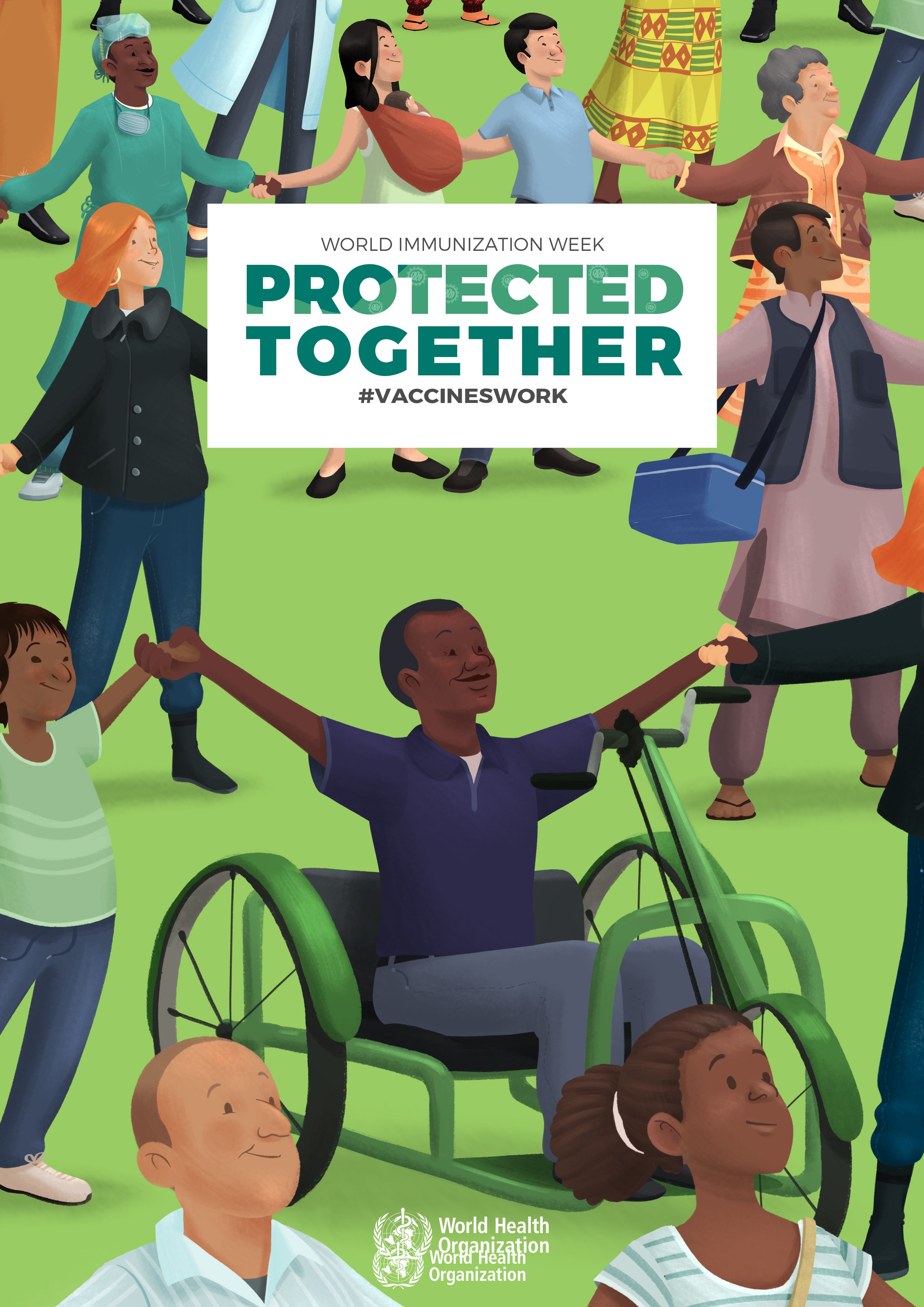
References
Public Health Online: The truth about vaccines
Unherd.com: Don't dismiss the anti-vaxxers
NHS.uk: Why vaccination is safe and important
CDC: Understanding how vaccines work
Wikipedia: Alfred Russel Wallace
The Spectator, UK: How to win over vaccine sceptics
Behavioural Scientist: How Fraud and a Broken Publishing System Fuelled the Vaccine Autism Myth
Undark.org: Many Anti-Vaxxers Don't Trust Big Pharma. Here's Why.
Wikipedia: 1976 swine flu outbreak
